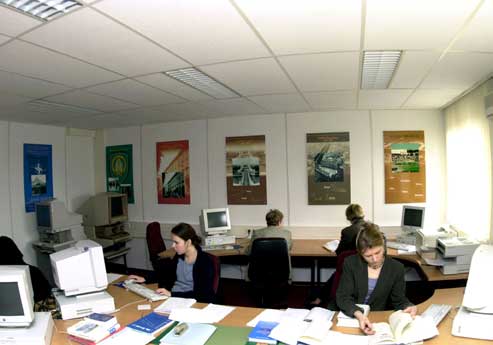Archives Committee
The Archives Committee assists and advises the North Atlantic Council (NAC) on all archives and records-related matters to ensure the preservation of and public access to information of permanent value held in the NATO Archives. Reporting directly to the NAC, it is the only body tasked with NATO-wide responsibilities related to the corporate management of the Organization’s records and archives.

Formally established in 1999, the Archives Committee is mandated to maintain, implement and update records and archives policies and procedures throughout NATO to ensure all requirements emerging from NATO’s missions are met. It serves as the primary forum of exchange and consultation to facilitate dialogue between the Allies on all records and archives matters.
Role of the Archives Committee
The Archives Committee provides guidance to the NAC regarding the management and preservation of the Alliance’s records and archives. It provides a records and archives perspective to Information Management at NATO by reviewing, expanding and monitoring compliance of policies on the retention, disposition, long-term preservation and public disclosure of information.
To support NATO’s ongoing engagement with the public, the Archives Committee raises awareness of the Organization’s archival heritage through the preservation and public disclosure of records of permanent value related to the evolution of NATO, its missions, consultations and the decision-making process. Members also play an advocacy role with their respective governments to emphasise the need for the NATO Archives, their benefits, and the requirements for proper funding.
Working mechanisms
The Archives Committee
The Archives Committee reports directly to the NAC through an annual report. It normally meets once a year but will meet more often should the need arise. It also holds workshops once or twice a year.
All NATO countries are represented at the meetings either by members of Delegations, senior officials or senior national archivists. A senior member of the International Staff chairs the Archives Committee.
Representatives from the International Staff and the International Military Staff, as well as senior officials from both civil and military bodies at NATO, support the work of the Archives Committee.
On behalf of the Archives Committee, the NATO Archivist is responsible for drafting, publishing and amending NATO-wide policies and directives for the management of NATO’s collective institutional memory. The implementation of these policies and guidelines fall into two main areas of responsibility: acquisition and holdings management; and declassification and public review.
Acquisition and holdings management
The Archives Committee is responsible for ensuring that recognised records and archival management practices and standards are implemented at NATO regarding the retention, disposition and long-term preservation of NATO records. It also oversees the drafting and approval of records and archives policies related to the management of NATO’s operations and the closure of NATO civilian and military bodies. When inactive, all NATO records of permanent value are transferred to the NATO Archives.
The Archives Committee also oversees the digital acquisition and digital preservation of electronic records of permanent value across NATO. The committee ensures that NATO policies and procedures stay up-to-date in the face of the increasing complexity and exponential growth of digital records.
The NATO Archives, on behalf of the Archives Committee, acquires, describes and preserves the archival holdings of the Organization indefinitely.
Declassification and Public Disclosure Review
The Archives Committee aims to foster transparency and increase the understanding of the role of the Alliance by making NATO records available through the Public Disclosure Programme. Through this programme, managed and coordinated by the NATO Archivist, 30-year-old records of permanent value are identified and proposed for declassification and public disclosure review. Once approved by the competent authorities in the member countries, the records are made available for public consultation in the NATO Archives Reading Room at NATO Headquarters in Brussels, Belgium. Ad-hoc requests made by competent authorities in member countries for public disclosure of records less than 30 years old also fall under the responsibility of the Archives Committee.
Evolution of the Archives Committee
In response to requests from researchers and the academic community for the historical documents of the Alliance, the process to establish the Archives Committee, and with it the NATO Archives, began in earnest in 1989.
An ad-hoc group composed of members of the International Staff and archival experts from member countries was created to prepare guidance for the release of NATO information. In light of the size of the collection and the volume of work it represented the process was strengthened with the creation of a group of Deputy Permanent Representatives reinforced with national archivists and consultants, who were hired by the Organization to prepare the way for the implementation of a release policy. The consultants recommended that an advisory body be established to assist the Council in the corporate management of the NATO Archives.
The NATO Archives officially opened on 19 May 1999 – the year of the 50th anniversary of the founding of the Alliance – and on 10 September 1999, the mandate of the Archives Committee was officially approved by the NAC. The formal establishment of the Archives Committee and the NATO Archives led to the availability of the Alliance’s records to the public for the first time. With the NATO Archives Online portal, researchers are able to enjoy even greater access to publicly disclosed NATO documents related to the Alliance’s history, evolution and decision-making process.
